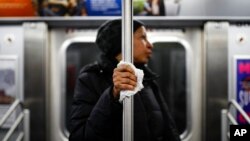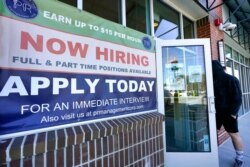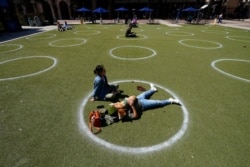In the United States, as millions of people are getting vaccinated and signs indicate the pandemic is easing, there is an excitement about the possibility of things going back to normal.
Many people are looking forward to attending sports events and concerts and dining inside restaurants again. But for others, returning to normalcy provokes an uneasiness about what the new normal will look like.
"Transitions are hard, especially after a collective trauma," Lucy McBride, a primary care physician in Washington, told VOA.
"While planning for a post-pandemic life can feel comfortable, thinking about the future too much can also increase our anxious thoughts," said Kevin Antshel, director of the clinical psychology program at Syracuse University in Syracuse, New York.
According to a survey by the American Psychological Association, about half of adults are uncomfortable about returning to in-person interactions after the pandemic. Their concerns range from getting COVID-19 to communicating with friends, family and co-workers again.
"Some people will feel paralyzing anxiety about resuming their normal activities after being in a fear mode for more than a year," McBride said. Even when the threat is gone and they've been vaccinated, it is going to take time for them to be comfortable reentering society after the pandemic, she said.
That's true for Cassie Davis in Pensacola, Florida, whose uncle died of the virus. Even though she got vaccinated, she is nervous about being near people in shopping centers.
"When my uncle died, it really hit home how terrible the virus is and that it might never completely go away," she said.
Some people will "feel a loss because things are different," said Karestan Koenen, a professor of psychiatric epidemiology at the Harvard T.H. Chan School of Public Health in Boston. That could mean feeling uncomfortable with a good friend you haven't seen for a long time or losing a job and looking for new one.
Some 'quite comfortable'
Others, however, have found contentment in their lifestyle during the pandemic.
They "have grown quite comfortable being alone," Antshel pointed out. "They've grown accustomed to not having to interact with people or fearing scrutiny and rejection from others."
"I have been enjoying my own company by being at home," said Elizabeth Albrecht, a single 27-year-old who lives in Washington. "I have no desire to go out with my friends all the time like I did before."
It's also going to be stressful unlearning some of the things you were supposed to do during the pandemic, said Deborah Serani, a psychologist and professor at Adelphi University in Garden City, New York. For example, she said, "how do I interact with everyone with their masks off?"
Patrick Reed in Alexandria, Virginia, who just got vaccinated, is trying to figure that out. Virginia's mask mandate recently changed to allow fully vaccinated people to participate in outdoor activities and small outdoor gatherings without wearing masks.
"I didn't like wearing a mask for months and then got used to it," he said, "and now I don't feel comfortable not having it on around people."
A matter of time
According to Christine Runyan, a clinical psychologist and professor at the University of Massachusetts Medical School, it will take time for everyone to adjust to the changes, but some will do that quicker than others.
"Our nervous systems are quite sensitive to these rapid adjustments," she said. "A lot of people might find themselves really tired after in-person social engagements because they're not used to it."
Antshel suggested that people "reacclimate gradually" back into society and not isolate themselves.
"I'm hoping we're going to come back together with a greater appreciation and gentleness for each other," Serani said.







